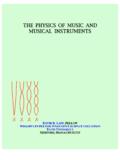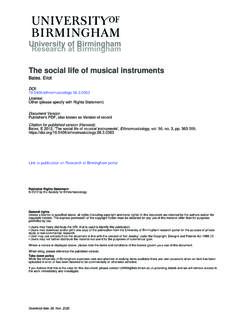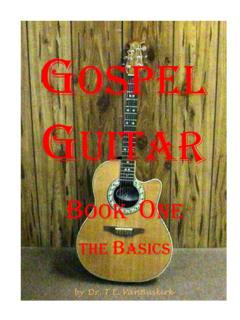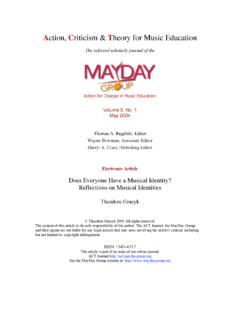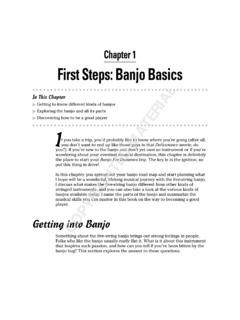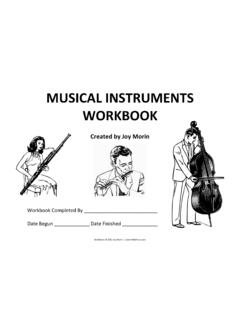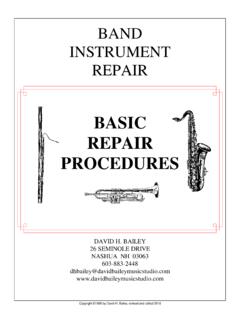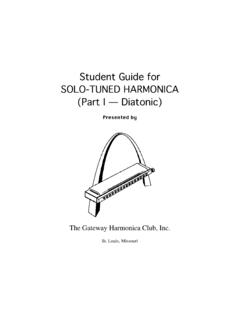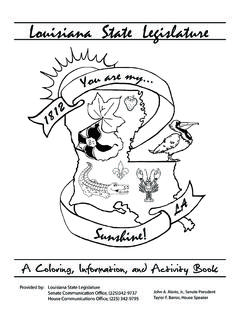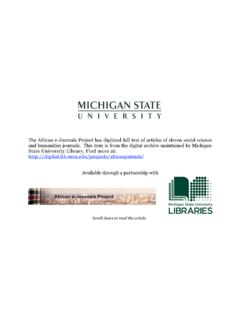Transcription of 2018 INSTRUMENTAL HANDBOOK - scotch.vic.edu.au
1 2018 INSTRUMENTAL HANDBOOK FOR STUDENTS & PARENTS Scotch College Melbourne Introduction 1 Why Learn an Instrument 1 Why Learn at School 1 When is The Right Time to Start Learning 2 Which Instrument Should My son Learn 2 Is There Provision For Students To Try An Instrument As Part Of The School Curriculum 2 Junior School String Program 3 Orchestral instruments other than strings 3 The Procedure for Learning an Instrument 3 Basic Structure of the Department 3 Enrolment Procedure for INSTRUMENTAL Lessons 3 Theory Lessons 4 Hire of instruments 4 Time-tabling of INSTRUMENTAL Lessons 4 Student Illness and Absent 4 Duration of INSTRUMENTAL Lessons 5 Fees for Tuition 5 Explanation of Billing 5 Termination of Lessons 5 Start of Year Procedure 5 Security and Care of instruments 6 Ensembles 6 Examinations and Assessments 6 Australian Music Examination Board 7 Internal Assessments 8 Mater Classes 8 Concerts and Recitals 8 What Parents Can Do To Help 9 VCE Music 10 The Music Auxiliary 10 Extension Ensembles 11 Music Scholarships 11 1 Introduction The purpose of this booklet is to provide a guide for parents and students to INSTRUMENTAL music at Scotch College.
2 The Music School at Scotch is large and quite complex, and it is hoped that this guide to the workings of the Music School will help parents and students derive full benefit from the Music School. Why Learn An Instrument? The benefits of learning a musical instrument are many. They include the development of fine motor co-ordination, superb aural training, and the development of a sense of discrimination. In addition, the art of learning to read music and transfer the symbols on the printed page into the physical act of playing is very beneficial for the intellectual development of the child. As the student progresses, he will develop a greater sense of aesthetic and cultural appreciation. Other benefits include the social involvement of making music with others, the development of self-discipline required to practise, enhanced self-esteem, and appreciation of music at a far higher level than could ever be learnt or experienced just from passive listening.
3 Playing a musical instrument can be a lifelong source of enjoyment. While relatively few students decide to make a full-time living from professional performing, many continue to play (or sing) at university and later in community orchestras, choral societies, and play chamber music with friends. In addition, the music one experiences at school includes some of the great classics, and the appreciation and insight experienced from performing this music remains with the student to permanently enhance his quality of life. Why Learn At School? While it is perfectly sensible to learn a musical instrument outside school if one has access to a good teacher, there are many additional benefits that come from learning within the system of Scotch College. These include: A carefully selected and appropriately qualified teacher. Progress which is monitored regularly by the head of the department concerned (eg.)
4 Head of Strings). Ensemble participation at an appropriate level for the student. Examinations and assessments. Regular performance opportunities. Opportunity to perform in master classes and to attend specialist classes given by eminent musicians from Australia and overseas. Facility for inexpensively hiring an instrument. Regular contact with the parent via the Record book and written reports twice yearly. 2 When Is The Right Time To Start Learning? The correct time to start learning an instrument will vary from child to child. With regard to very young children, the instrument is a major consideration in itself. Some instruments require the hands to be a certain size and others can be simply too heavy for a young child to hold. However, the piano can be started at a very early age as can the violin and cello. Violins and cellos come in different sizes so that the instrument can be matched to the child and replaced with a larger one as the child grows.
5 An important consideration is whether or not the child has the necessary maturity to commence learning, and in many cases the parent will have an instinct for this. Students do not normally commence lessons on Woodwind and Brass instruments until Year 4 in the Junior School, but piano and stringed instruments may be started earlier. Students entering the college at Year 7 may start learning any instrument immediately, although it is advisable to discuss the choice of instrument with the Director of Music. Which Instrument Should My Son Learn? Tuition in all orchestral instruments as well as piano, guitar (classical, electric and bass), organ, composition music, singing and bagpipes is offered at Scotch. The choice of instrument needs careful consideration. Probably the best guide is the sound of the instrument which the student likes most. After all, the student will spend many years listening to the sound of that instrument.
6 However, the popularity of an instrument should also be considered as INSTRUMENTAL balance within ensembles must be maintained. For example, there is little sense in having two hundred students learning the saxophone if there are no students of the trombone or clarinet, as the resultant imbalance in the ensembles would limit the performance repertoire, thus all the students would have a sadly reduced musical experience. instruments traditionally under-subscribed include the french horn, oboe and bassoon. instruments which are over popular include the saxophone and trumpet. strings (aside from the guitar) are in a particularly enviable position in that orchestras require plenty of them, and the range of music which can be played spans many centuries. Talking to the Director of Music can be helpful in ensuring that your son learns an instrument which is likely to be in demand as your son progresses.
7 This will result in faster progress into ensembles, and the chance to play music at a higher level a little earlier. A further consideration is the age of the student, and discussion with the Director of Music is strongly advised. Is There Provision For Students To Try An Instrument As Part Of The School Curriculum? All students at Scotch receive some INSTRUMENTAL tuition. This is given as a group lesson with no separate charge being made to the parents. 3 Junior School String Program: Suzuki violin and cello are available at any time in the Junior School. In Year 2, all boys will have the opportunity to learn the violin, viola, cello or double bass for 2 terms in small groups. At the completion of these lessons, parents will be contacted as to whether the student should continue learning. With very young students (Prep & Year 1), it is essential that a parent attends the lessons and offers the appropriate support at home.
8 The fees for individual lessons are detailed separately. Orchestral instruments other than strings: Woodwind and brass lessons are given in much the same way at Year 5, and many students continue with individual lessons after a few introductory lessons in the class groups. Students entering the school at Year 7 are also given this opportunity as part of the Year 7 curriculum. The Procedure for Learning an Instrument Basic Structure of the Department The Director of Music is responsible for the Music School at Scotch College. He is assisted by the Head of Junior School Music and the Heads of the various departments. For any enquiries in reference to your son s INSTRUMENTAL lessons, please contact the appropriate Head of Department. Head of Strings & Guitar Mr James deRozario 9810 4450 Head of Keyboard Mrs Teresa Lavers 9810 4116 Head of Woodwind & Bands Ms Megan Philip 9810 4351 Head of Brass Mr Chris Farrands 9810 4350 Head of Percussion & Drum Kit Ms Jude Hallum 9810 4375 Head of Choirs, Voice & Composition Mr Andrew Hunter 9810 4218 Head of Junior Music School Ms Jenni Thom 9810 4223 Other enquiries Music School Office 9810 4219 Enrolment Procedure for INSTRUMENTAL Lessons To commence lessons, a music tuition form must be lodged with the Music School.
9 Forms can be obtained from the Music Office (or from Kate Elek in the case of Junior School students) either in person, download from the School s website or by calling 9810 4219. A student can commence lessons at any time during the School year. However, there is a waiting list for some instruments as the demand for lessons exceeds the teachers time and teaching space. 4 Theory Lessons Theory lessons are offered before school on Tuesday, Wednesday & Thursday so that students of different ages but approximately the same theory standard may attend. The cost of a forty-minute class is $ per student. Theory lessons should be taken by students once they reach some degree of fluency on their instrument. For AMEB practical exams from grade 6, there are additional theory (or musicianship) requirements. Hire Of instruments Most instruments can be hired from the Music School at a charge of $100 per semester.
10 An exception is small sized violins for which the charge is $80 per semester. The purpose of the hire system is to allow the parent and student time to evaluate whether or not the student wishes to continue playing the instrument, thus avoiding the expense of buying an instrument outright. The usual hire period is for one year, although in the case of particularly expensive instruments this time can be extended providing there is no immediate demand for that instrument. There is a provision on the enrolment form to hire which must be completed before the instrument can be allowed home. instruments are not covered by the School s insurance except while on school premises, or when in use during an outside school activity, therefore parents are responsible for the replacement cost of an instrument resulting from any loss or damage while it is in the student s custody. Time-tabling Of INSTRUMENTAL Lessons Each head of an INSTRUMENTAL department makes sure that students are timetabled and assigned to a suitable teacher, students are then informed via email.

